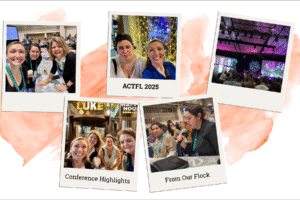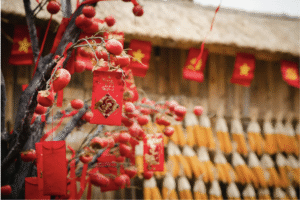
Hebrew Phrases to Impress Your Family During the High Holidays and Fall Festivals
The High Holidays, including Rosh Hashanah and Yom Kippur, are the most meaningful days on the Jewish calendar. This fall, families gather to reflect, pray, and celebrate tradition. Learning a few key Hebrew phrases can help you participate fully, connect with relatives, and honor the culture.
Beyond the High Holidays, fall also brings Sukkot, Shemini Atzeret, and Simchat Torah—festivals full of joy, community, and ritual. Using the right Hebrew holiday greetings shows thoughtfulness, respect, and cultural awareness.
With LanguageBird, you can learn Hebrew online with native-level instructors, mastering pronunciation, context, and usage so you can confidently use these phrases during the holidays and all year long.
High Holidays: Rosh Hashanah and Yom Kippur
Rosh Hashanah (ראש השנה) – Jewish New Year
Rosh Hashanah marks the Jewish New Year and begins the Ten Days of Repentance leading to Yom Kippur. Families celebrate with festive meals, symbolic foods like apples and honey, and the shofar, a ram’s horn blown in synagogue to inspire reflection.
-
Shana Tova (שנה טובה) – Happy New Year
The most common Rosh Hashanah greeting, wishing friends and family a sweet, prosperous year. -
Yasher Koach (יישר כוח) – Well done / May your strength be firm
Use this phrase to honor someone who leads prayers, reads from the Torah, or hosts meaningful holiday activities.
Yom Kippur (יום כיפור) – Day of Atonement
Yom Kippur is the holiest day of the year, focused on fasting, repentance, and reconciliation. Traditions include a 25-hour fast, intensive synagogue prayers, and reflection on the past year.
-
Gmar Chatima Tova (גמר חתימה טובה) – May you be sealed for a good year
A traditional greeting toward the end of Yom Kippur, expressing hope for a favorable judgment. -
Tzom Kal (צום קל) – Easy fast
Say this to those observing the fast, showing empathy and support.
Tip: With LanguageBird, you can practice these phrases with native Hebrew speakers, learning proper pronunciation and usage so your greetings feel natural.
Additional Fall Holidays: Sukkot, Shemini Atzeret, Simchat Torah
Sukkot (סוכות) – Feast of Tabernacles
Sukkot celebrates the Israelites’ desert journey. Families build temporary huts called sukkot, enjoy meals together, and perform the Four Species ritual (Lulav, Etrog, Hadas, Aravah).
-
Chag Sameach (חג שמח) – Happy Holiday
A joyful Hebrew greeting suitable for Sukkot and other fall festivals. -
L’Chaim (לחיים) – To life
Traditionally used as a toast during festive meals.
Shemini Atzeret (שמיני עצרת) and Simchat Torah (שמחת תורה)
Following Sukkot, these holidays are about reflection, celebration, and Torah. Shemini Atzeret focuses on prayer for rain, while Simchat Torah celebrates completing the yearly Torah reading cycle.
-
Mazal Tov (מזל טוב) – Congratulations
Appropriate for milestones, Torah celebrations, and family achievements. -
Chag Sameach (חג שמח) – Happy Holiday
A festive greeting for both Shemini Atzeret and Simchat Torah.
Tip: Learning these phrases through LanguageBird’s online Hebrew lessons allows you to understand the cultural significance while practicing real-life conversation.
Core Hebrew Phrases for the High Holidays and Fall
-
Shalom (שלום) – Peace, hello, goodbye
-
B’hatzlacha (בהצלחה) – Good luck
-
Todah (תודה) – Thank you
-
Ani Mevin (אני מבין) / Ani Mevinah (אני מבינה) – I understand
Mastering these phrases with LanguageBird’s native instructors ensures your greetings feel authentic and meaningful.
FAQ: Hebrew Phrases for the High Holidays and Fall Festivals
Q: What is a common Hebrew greeting for Rosh Hashanah?
A: Shana Tova — Happy New Year
Q: How do you say Happy Yom Kippur in Hebrew?
A: Gmar Chatima Tova — May you be sealed for a good year
Q: What should I say to someone fasting on Yom Kippur?
A: Tzom Kal — Wishing them an easy fast
Q: What is a general Hebrew holiday greeting?
A: Chag Sameach — Happy Holiday
Q: What does Yasher Koach mean?
A: “Well done” or “May your strength be firm,” said after someone completes a mitzvah or accomplishment
Q: Which phrase is used as a toast during holiday meals?
A: L’Chaim — To life
Q: What phrase is used to congratulate family or friends?
A: Mazal Tov — Congratulations
Pro Tip: Practicing these phrases online with LanguageBird ensures you’re ready to participate confidently in every holiday celebration.
Learn More Hebrew for Hanukkah
Want to continue learning Hebrew for other Jewish holidays? Check out our blog post: Essential Hebrew Phrases to Learn for Hanukkah. It’s perfect for expanding your holiday vocabulary and celebrating the season with confidence.
2. Yasher Koach
Yasher koach is a Hebrew phrase that means “congratulations”. Did you perform well in your exams? Yasher Koach. This phrase is derived from yishar koach, which stands for, “may it be for strength (koach) be straightened (yishar)”.
In Deuteronomy, God spoke to Moses regarding the first tablet that he broke. The Rabbis translated the reading as if God was proud of Moses for breaking the tablet, saying “Yasher koech for breaking” in reaction to the people abandoning him and starting to worship the Golden Calf.
4. Slicha
Being humble and polite to your family members and other people matters a lot. There are simple ways of showing politeness. Slicha is a Hebrew expression that means “sorry” or “excuse me.” You can use this word to get your family’s attention or try to avoid a fight.




